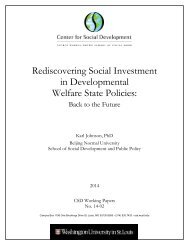Exploring and Assessing Intercultural Competence - Center for ...
Exploring and Assessing Intercultural Competence - Center for ...
Exploring and Assessing Intercultural Competence - Center for ...
Create successful ePaper yourself
Turn your PDF publications into a flip-book with our unique Google optimized e-Paper software.
A. General<br />
<strong>Exploring</strong> <strong>and</strong> <strong>Assessing</strong> <strong>Intercultural</strong> <strong>Competence</strong><br />
The project design <strong>and</strong> plan were initially in<strong>for</strong>med by a review of the intercultural literature<br />
coupled with our own empirical experience. A search <strong>and</strong> analysis of other relevant assessment<br />
tools provided further basis <strong>for</strong> creating the survey questionnaire <strong>for</strong>m used in this study. The<br />
inclusion of open-ended questions gave respondents an opportunity to contribute additional<br />
insights from their experiences <strong>and</strong> to identify other issues. Finally, personal interviews of<br />
selected respondents generated additional data.<br />
A combination of structured <strong>and</strong> open-ended processes resulted in producing quantitative <strong>and</strong><br />
qualitative data regarding program participants in three MOs – Ecuador, Great Britain, <strong>and</strong><br />
Switzerl<strong>and</strong>. Identifying outcomes that converged or diverged regarding the development of<br />
participant intercultural competencies <strong>and</strong> how these experiences affected their lives beyond the<br />
program, provided further indicators regarding the furtherance of FEIL’s vision <strong>and</strong> mission. To<br />
summarize, this study focused on the following goals:<br />
1) to further refine our notion of intercultural competence – definition, essential traits <strong>and</strong><br />
characteristics, components <strong>and</strong> their interconnections, <strong>and</strong> developmental levels;<br />
2) to investigate the role of host language proficiency <strong>and</strong> its effects on ICC<br />
development;<br />
3) to advance work on an assessment instrument to monitor <strong>and</strong> measure ICC<br />
development, based on our revised conceptualization;<br />
4) to pilot the instrument in three MOs,<br />
5) to learn about the impact of this experience on alumni, volunteers <strong>and</strong> hosts;<br />
6) to compile <strong>and</strong> analyze survey findings from this pilot survey;<br />
7) to finalize the test instrument <strong>for</strong> future use;<br />
8) <strong>and</strong> finally, to disseminate the results <strong>and</strong> make the instrument available <strong>for</strong> use by<br />
others<br />
We were especially keen to learn more about the impact of intercultural contact on sojourners <strong>and</strong><br />
hosts in terms of how it affected their lifestyle choices, values, work choices as well as how their<br />
experience of intercultural contact affected others (the multiplier effect) – all outcomes which<br />
contribute to <strong>and</strong> further the Federation’s Mission. These ef<strong>for</strong>ts are consistent with the<br />
movement towards outcomes assessment emerging over the past two decades.<br />
B. Timeline <strong>and</strong> Stages<br />
This Project was designed to fit within the work schedules of participating MOs to ensure<br />
maximum cooperation <strong>and</strong> minimal interference of their office routines. The hiring of a Research<br />
Assistant (RA) in each office was planned to avoid placing additional burden on already busy <strong>and</strong><br />
dedicated staff. The timeline, there<strong>for</strong>e, was based on administration of questionnaires at critical<br />
stages in their program cycles plus time to complete data compilation <strong>and</strong> summary reports at the<br />
end.<br />
The project took place from July 2005 through December 2006 in a series of four stages. A fifth<br />
stage of initial dissemination was included in preparation <strong>for</strong> stages 6 <strong>and</strong> 7, which contemplate<br />
further dissemination beyond the (funded) research ef<strong>for</strong>t itself. These stages involved the<br />
following activities:<br />
<strong>Center</strong> <strong>for</strong> Social Development<br />
Washington University in St. Louis<br />
11
















